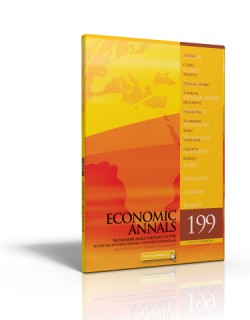RESTORING INTERNATIONAL COMPETITIVENESS IN CROATIA: THE ROLE OF FISCAL AND MONETARY POLICY
##plugins.themes.bootstrap3.article.main##
##plugins.themes.bootstrap3.article.sidebar##
Tomislav Ćorić
Hrvoje Šimović
Milan Deskar-Škrbić
Hrvoje Šimović
Milan Deskar-Škrbić
Abstract
Croatia has joined the European Union as a country with several substantial structural problems, of which the most important is weak competitiveness. Although competitiveness can be viewed from the ‘institutional’ perspective, which includes World Development Indicators (WDI) and Doing Business reports, in this paper the authors focus on the more standard view of competitiveness based on unit labour costs (ULC) and real effective exchange rate (REER). As a small, open and highly dollarized/euroised economy that has to coordinate its economic policy with the EU policy framework, Croatia has limited space for increasing international competitiveness using monetary policy measures aimed at (nominal) devaluation of the national currency. Therefore economic policy stakeholders should focus on decreasing unit labour costs and real effective exchange rate mainly through the process of internal devaluation, which is based on adequate fiscal policy measures. In this paper the authors analyse the role of monetary and fiscal policy in the deteriorating real effective exchange rate and unit labour costs since 2000, and their current capabilities and restrictions in restoring international competitiveness. The Structural VAR model (SVAR) is used to estimate the effects of foreign (banking) capital, credit growth, and current public expenditure on REER and ULC. The preliminary hypothesis of the paper is that monetary policy should continue to support bank lending activities and the role of fiscal policy is to achieve an internal devaluation, which will increase the competitiveness of the Croatian economy. Restoring international competitiveness is necessary due to its impact on net exports and consequently the economic recovery of the national economy, which has faced recession conditions for five years in a row. Also, restoring competitiveness is one of the most important preconditions for the success of a small country joining the single European market.
##plugins.themes.bootstrap3.article.details##
Keywords
ECONOMIC POLICY, CAPITAL FLOWS, COMPETITIVENESS, SVAR, CROATIA
JEL Classification
E52, E62
Issue
Section
Articles
How to Cite
Ćorić, T., Šimović, H., & Deskar-Škrbić, M. (2013). RESTORING INTERNATIONAL COMPETITIVENESS IN CROATIA: THE ROLE OF FISCAL AND MONETARY POLICY. Economic Annals, 58(199), 39-56. https://doi.org/10.2298/EKA1399039C
How to Cite
Ćorić, T., Šimović, H., & Deskar-Škrbić, M. (2013). RESTORING INTERNATIONAL COMPETITIVENESS IN CROATIA: THE ROLE OF FISCAL AND MONETARY POLICY. Economic Annals, 58(199), 39-56. https://doi.org/10.2298/EKA1399039C

